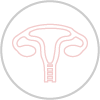The condition is characterised by persistent pain in the vulva, which is the external portion of the female organs and includes the vaginal opening and labia. The patient can experience searing pain, burning sensation, stinging, soreness, rawness or irritation around the vulval area and vaginal opening, in the absence of any identifiable skin disease or infection. This can occur occasionally or constantly, and can last for months or even years at a time. Even though the pain is very real, the vulva often appears to be normal on examination, and in many cases, doctors and clinicians struggle to pinpoint the exact cause.
The pain can be focal to a particular area, or generalised over the entire vulval region. It can be ‘provoked’ by certain things e.g. tight clothing, intercourse, use of tampons etc, or ‘unprovoked’ i.e. it can be present no matter what, or comes on spontaneously with no particular trigger. Either way, it is a real issue for women suffering with this pain. This condition can impair a woman’s life in numerous ways, most notably by negatively affecting sexual relationships. The chronic pain of vulvodynia can sap all the enjoyment out of life, as it may make even walking or sitting difficult. Women struggle with management of the pain, sexual problems, relationship problems, reduced activity levels, isolation and problems with self-esteem.
Causes of Vulvodynia:
- Irritation or hypersensitivity of the nerve fibres in the vulval skin, or deeper into the vaginal area
- Previous surgery to the vulval area
- Spinal nerve compression
- Persistent vaginal thrush, or recurrent herpes infection or other skin conditions
- A drop in the hormone oestrogen, causing dryness of the vulval skin, especially during the menopause
- Stress
Many women are embarrassed to seek help, but an experienced Gynaecologist and Specialist Women’s Health Physiotherapist can offer self-care advice and tips, and treatment aimed at relieving your symptoms and improving your quality of life. It is important to have the condition diagnosed by a Gynaecologist, or your GP, as there are certain medications that can be prescribed to help alleviate the pain.
Physiotherapy for Vulvodynia:
- In depth assessment of gynae, obstetric, sexual and symptom history
- Physical examination of the vulval area
- Internal examination (with consent) of the vaginal area: to assess pain, sensation, tightness, tone & activity of the muscle
- Treatment of findings with manual techniques: soft tissue release, trigger point release, desensitisation, stretching, heat/cold, massage
- Lifestyle advice and management: clothing, hygiene products, gels, lubricants, activities, positioning
- Sexual advice, and if required referral to a psychosexual counsellor or cognitive behavioural therapist
- Stress management advice
- Teaching correct pelvic floor muscle activation
- Equipment as indicated: Vaginal dilators, biofeedback
- Joint discussion with patients’ partners of the condition and its effects



